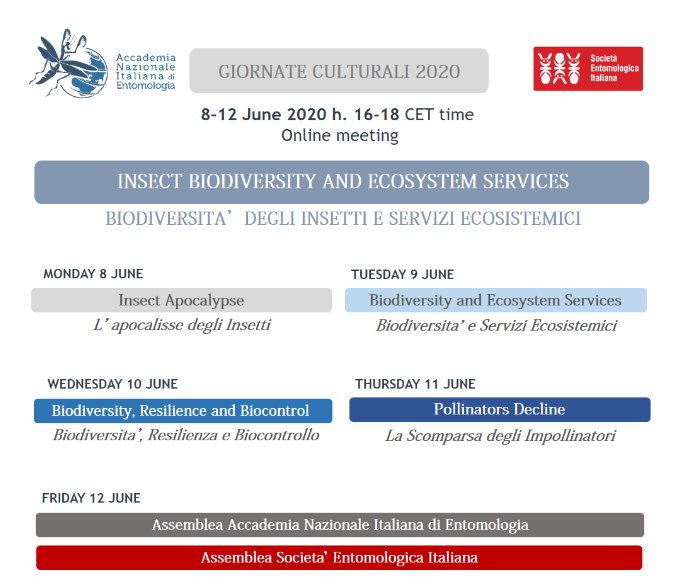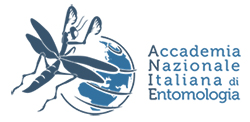Cultural Days
The Italian National Academy of Entomology promotes and sponsors Cultural Days at various venues throughout the country on specific topical entomological issues. The Cultural Days are organised by Academicians, in collaboration with the Italian Entomological Society, and see the active involvement of national and international scientific personalities. Multidisciplinary topics are addressed in collaboration with other scientific societies.
2020
“Insect biodiversity and ecosystem services
8-12 June 2020
Webinar
Under the auspices of the Marcello La Greca’ School of Higher Education.
In collaboration with Italian Entomological Society.
Click here to view the full programme with registration links, titles of speeches, speakers and times

Click here to view the Book of Abstracts
2017
‘Entomological Events in Naples
Friday 17 November 2017
Naples – Congress Centre University of Naples Federico II
I Session: Insect-plant interactions
9:30 – 10:05
Angharad Gatehouse, Newcastle University, UK
Plant Response to Stress: Can this be exploited for Crop Protection?
10:05 – 10:30
Deepa Pureswaran, Laurentian Forestry Centre, Québec, Canada
Host tree-insect interactions in northern forest ecosystems in a changing climate
10:30 – 10:55
Salvatore Cozzolino, University Federico II, Napoli, Italy
Smart plants or naive insects?
11:00 – 11:30
Coffee break
11:30 – 11:55
Rosa Rao, University Federico II, Napoli, Italy
How plants react to the insect challenge
11:55– 12:20
David Giron, CNRS / Université François-Rabelais , Tours, France
From leaf-miners to gall-inducers: a continuum of plant manipulators?
12:20 – 12:45
Stefano Colazza, University of Palermo, Italy
Ecology of egg parasitoids in crop protection
12:45– 13:10
Maria Cristina Digilio, University Federico II, Napoli, Italy
Insect and microorganisms interactions and the induction of plant defence
13:10 – 13:30
General discussion
13:30 – 14:30
Lunch
II session: Insects for the court, Insects for the History: a journey through Forensic
14:30 – 14:35
Introduction – Stefano Vanin, University of Huddersfield, UK
Entomology and Funerary Archaeoentomology
14:35 – 15:05
Carlo Campobasso, University of Campania Luigi Vanvitelli, Napoli, Italy
PMI estimation a challenge for forensic pathologists
15:05 – 15:35
Gino Fornaciari, University of Pisa, Italy
Hidden information within mummies and other burials
15:35 – 16:05
Stefano Vanin, University of Huddersfield, UK
Forensic Entomology and Funerary Archaeoentomology: a source of answers
16:05 – 16:30
General discussion
16.30 – 17.00
Presentation of the book: “Il piacere delle api” – Paolo Fontana
2016
‘Novelties and perspectives in the study of arthropod pathogen vectors’
Friday 18 November 2016
Florence, La Specola – Museum of Natural History, Via Romana 17, Lecture Room 1 entrance garden first floor
9.30-9.40
Introduction. Claudio Bandi (Department of Biosciences University of Milan) and Alessandra della Torre (Department of Public Health & Infectious Diseases, Università di Roma “La Sapienza”)
9.40-10.10
Transgenic strategies to combat malaria and arboviruses: the transition from laboratory to field. Luca Facchinelli (Post-Doc, Imperial College, London, UK)
10.10-10.40
New genomic perspectives in the study of hybridisation zones between the main Afrotropical malaria vectors of the complex Anopheles gambiae. Verena Pichler (PhD student; Department of Public Health & Infectious Diseases, Università di Roma “La Sapienza”).
10.40-11.10
Coffee break
11.10-11.40
Hard ticks as a risk factor for the development of chronic degenerative diseases: the case of Lyme disease. Davide Sassera (Post-Doc, University of Pavia)
11.40-12.10
Of viruses, mosquitoes and people. Fausto Baldanti (IRCCS Policlinico San Matteo, Pavia)
12.10-12.40
Discussion
‘Drosophila suzukii: a midge threatening fruit growing’
Thursday 17 November 2016
Florence, La Specola – Museum of Natural History, Via Romana 17, lecture room 1 entrance garden first floor
14.30-14.40
Introduction. Claudio Ioriatti (Fondazione Edmund Mach San Michele all’Adige, TN) and Nicola Mori (DAFNAE – University of Padua)
14.40-14.50
Drosophila Suzuki: origin, dissemination and current lines of research. Claudio Ioriatti (Edmund Mach Foundation San Michele all’Adige, TN)
14.50-15.25
Spotted Wing Drosophila: present situation in USA. Walton Vaughn (Oregon State University)
15.25-15.35
Cost-benefit analysis for controlling the spread and infestation of Drosophila suzukii on small fruits in northern Italy. Emanuele Del Fava (Bocconi University Milan)
15.35-15.45
Studies on introduction routes, structure and population dynamics of Drosophila suzukii in Italy. Gianfranco Anfora (Edmund Mach Foundation San Michele all’Adige, TN).
15.55-16.05
Ecology of Drosophila suzukii in north-eastern Italy. Lorenzo Tonina (DAFNAE – University of Padua).
16.05-16.15
Semiochemicals and monitoring techniques in Drosophila suzukii. Luciana Tavella (DISAFA – University of Turin)
16.15-16.45
Coffee break
16.45-16.55
Chemical, physical and agronomic means for the containment of Drosophila suzukii. Nicola Mori (DAFNAE – University of Padua).
16.55-17.05
State of the art and biological control guidelines for the containment of Drosophila suzukii in Italy. Antonio Biondi (DI3A University of Catania)
17.05-17.30
Flash talks: Role of acetic bacterial symbionts in the behavioural responses of Drosophila suzukii. Fabio Mazzetto (DISAFA Università di Torino)
– Reproductive behaviour and vibro-acoustic communication of Drosophila suzukii. Valerio Mazzoni (Fondazione Edmund Mach San Michele all’Adige, TN)
– Reproductive behaviour of wintering females of Drosophila suzukii in Trentino. Alberto Grassi (Fondazione Edmund Mach San Michele all’Adige, TN)
– Changes in the bacterial community associated with Drosophila suzukii in introduced populations. Luca Mazzon (DAFNAE – Università di Padova)
– Comparative genomics and molecular biology approaches for the control of Drosophila suzukii. Omar Rota-Stabelli (Fondazione Edmund Mach San Michele all’Adige, TN)
17.30-18.00
Discussion
2015
‘Insects: a sustainable resource for food’
Friday 16 January 2015
Department of Zoology, Via Romana 17, Florence
14,30-14,35
Presentation by the President of the Academy Romano Dallai.
14.35-14.45
Introduction by the Academician Stefano Turilazzi
14.45-15.25
Opportunities and constraints for insects in the food chain. Paul Vantomme (Senior Officer FAO, Roma)
15.25-15.30
Discussion
15.30-16.00
Insect consumption from a food safety perspective: regulatory framework and risk assessment. Antonia Ricci (Zooprophylactic Institute of the Venezie, Padua)
16.00-16.05
Discussion
16.05-16.20
Initiatives in Italy. Roberto Valvassori (University of Insubria)
16.20-16.35
Breeding insects for food: problems, cautions and perspectives. Mario Colombo (University of Milan)
16.35-16.50
Large-scale insect breeding and production chains. Silvia Cappellozza (CRA-API, Padua)
16.50-17.05
Using insects as bioprocessors: from food waste to the production of animal protein for animal feed. Morena Casartelli (University of Milan), Gianluca Tettamanti (University of Insubria)
17.05-17.20
Environmental benefits and costs of entomophagy. Sustainability of large-scale breeding. Anna Maria Fausto (University of Tuscia)
17.20-17.50
Discussion
17.50-18.00
Concluding remarks by the President of the Academy Romano Dallai and the President of the Italian Entomological Society Francesco Pennacchio
2014
“Arthropod vectors of diseases in humans and domestic animals”
Friday 3 October 2014
Department of Biology and Biotechnology Charles Darwin, University of Rome ‘La Sapienza’, Rome
10.30-10.40
Welcome address
10.40-10.50
Presentation of the cultural event
A.M. Fausto (Roma)
10.50-11.00
Introductory note
L. Gradoni (Roma)
11.00-11.30
Leishmania development in sand flies: parasite-vector interactions
P. Volf (Prague)
11.30-11.40
Discussion
11.40-12.10
Driving forces for changes in geographical distribution of Ixodes ricinus ticks in Europe
A. Rizzoli (S. Michele all’Adige, Trento)
12.10-12.20
Discussion
12.20-12.50
The cryptic complexity of malaria vectors in Africa: from Anopheles gambiae chromosomal forms to Anopheles coluzzii
A. della Torre (Roma)
12.50-13.00
Discussion
14.30-15.00
Probable autochthonous introduced malaria cases in Italy in 2009-2011 and the risk of local vector-borne transmission
R. Romi (Roma)
15.00-15.10
Discussion
15.10-15.40
The importance and significance of entomological monitoring for new and old pathogens transmitted by Culicidae
G. Capelli (Padova)
15.40-16.00
Discussion
16.30-17.00
Culicoides in Italy: highlights on Bluetongue and Schmallenberg vectorse
M. Goffredo (Teramo)
17.00-17.10
Discussion
17.10-17.40
Current knowledge on the distribution and biology of the recently introduced invasive mosquito Aedes koreicus
F. Montarsi (Padova)
15.40-16.00
Discussion
2013
“Contribution to the knowledge of Basal Polyneoptera. Structure, behaviour and reproduction: basic and applied aspects’.
Friday 11 October 2013
Research Centre for Agrobiology and Pedology (CRA-ABP), Via Lanciola 12/a – Cascine del Riccio – 50125 Firenze
10.30-10.35
Introduction
Proff. R. Dallai e S.Turillazzi
10.35-11.15
Polyneoptera or “lower Neoptera” ? new light on old and phylogenetic problems.
R. G. Beutel e B. Wipfler (Jena)
11.15-11.30
Discussion
11.30-12.10
Sociality in the minor orders of Polyneoptera
S. Turillazzi (Florence)
12.10-12.30
Discussion
12.30-14.00
Lunch break
14.15-14.45
From basic knowledge to applied studies: Plecoptera as a paradigm
R.Fochetti (Viterbo)
14.45-14.55
Discussion
14.55-15.35
Biology and Systematics of Italian Isoptera: Autochthonous and Invasive Species
B. Mantovani e A. Luchetti (Bologna)
15.35-15.45
Discussion
15.45-16.15
Comparative spermatology of the Phasmatodea confirms the basal phylogenetic position of Timema.
M.Gottardo (Siena)
16.15-16.25
Discussion
16.25-16.55
The structure of the male and female genital system of Zoraptera and reproductive behaviour of the group.
R.Dallai (Siena)
16.55-18.00
General discussion
2011
Evolution and Adaptations of Arthropods ” Basic Contributions to Insect Knowledge
Friday 13 May 2011
Department of Evolutionary Biology ‘Leo Pardi’, University of Florence, via Romana 17
14.30-14.35
Introduction
Proff. R. Dallai e S.Turillazzi
14.35-15.10
At the Origin of Insects: Hypothesis on the Diversification of Hexapods
Prof. F. Frati (Department of Evolutionary Biology – Siena)
15.10-15.45
Arthropod segments: an evo-devo story, between development and adaptation
Prof. A. Minelli (Department of Biology – Padua)
15.45-16.20
How to live in a mangrove: many questions and few answers.
Prof. M. Vannini (Department of Evolutionary Biology – Florence)
16.20-16.50
Adaptations in larval life in Coleoptera Meloides.
Prof. M. Bologna (Department of Environmental Biology Rome III)
16.50-17.20
Cephalic structures and food intake in Cecidomidae larvae.
Prof. M. Solinas (Department of Agricultural and Environmental Sciences – Perugia)
17.20-18.00
General discussion

